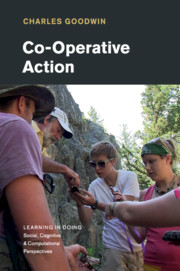Book contents
- Co-Operative Action
- Learning in Doing: Social, Cognitive and Computational Perspectives
- Co-Operative Action
- Copyright page
- Dedication
- Contents
- Figures
- Acknowledgments
- 1 What Is Co-Operative Action, and Why Is It Important?
- Part I Co-Operative Accumulative Action
- Part II Intertwined Semiosis
- Part III Embodied Interaction
- Part IV Co-Operative Action with Predecessors
- Part V Professional Vision, Transforming Sensory Experience into Types, and the Creation of Competent Inhabitants
- 20 The Emergence of Conventionalized Signs within the Natural World
- 21 Calibrating Experience and Knowledge by Touching the World Together
- 22 The Blackness of Black
- 23 Building Skilled, Knowing Actors and the Phenomenal Objects They Are Trusted to Know
- 24 Professional Vision
- 25 Conclusion
- References Cited
- Index
- Series page
23 - Building Skilled, Knowing Actors and the Phenomenal Objects They Are Trusted to Know
from Part V - Professional Vision, Transforming Sensory Experience into Types, and the Creation of Competent Inhabitants
Published online by Cambridge University Press: 03 November 2017
- Co-Operative Action
- Learning in Doing: Social, Cognitive and Computational Perspectives
- Co-Operative Action
- Copyright page
- Dedication
- Contents
- Figures
- Acknowledgments
- 1 What Is Co-Operative Action, and Why Is It Important?
- Part I Co-Operative Accumulative Action
- Part II Intertwined Semiosis
- Part III Embodied Interaction
- Part IV Co-Operative Action with Predecessors
- Part V Professional Vision, Transforming Sensory Experience into Types, and the Creation of Competent Inhabitants
- 20 The Emergence of Conventionalized Signs within the Natural World
- 21 Calibrating Experience and Knowledge by Touching the World Together
- 22 The Blackness of Black
- 23 Building Skilled, Knowing Actors and the Phenomenal Objects They Are Trusted to Know
- 24 Professional Vision
- 25 Conclusion
- References Cited
- Index
- Series page
Summary
In the midst of excavation at field schools, archaeology, as a community with a unique domain of expertise, is faced with the twin tasks of 1) transforming the world that is the focus of its inquiry into the distinctive objects of knowledge that animate its discourse, such as maps and relevant categorizations; and 2) creating new members of their community with the professional vision and skilled bodies required to systematically accomplish that transformation. This chapter investigates how the sensorium of a new archaeologist, her ability to see, feel, and understand the world in the ways required to transform it into archaeological phenomena, is created in the midst of action itself through co-operative excavation with a skilled, senior archaeologist. In addition to categorizations embedded within environmentally coupled gestures, a student’s use of a trowel to outline a feature creates a liminal object: a shape that will be later transferred to a map exists in the same visual field as the patterning in the dirt it represents iconically. This public demonstration of understanding can be modified by the senior archeologist to calibrate professional vision. Similar practices are pervasive in many different communities.
* * *
- Type
- Chapter
- Information
- Co-Operative Action , pp. 391 - 406Publisher: Cambridge University PressPrint publication year: 2017



